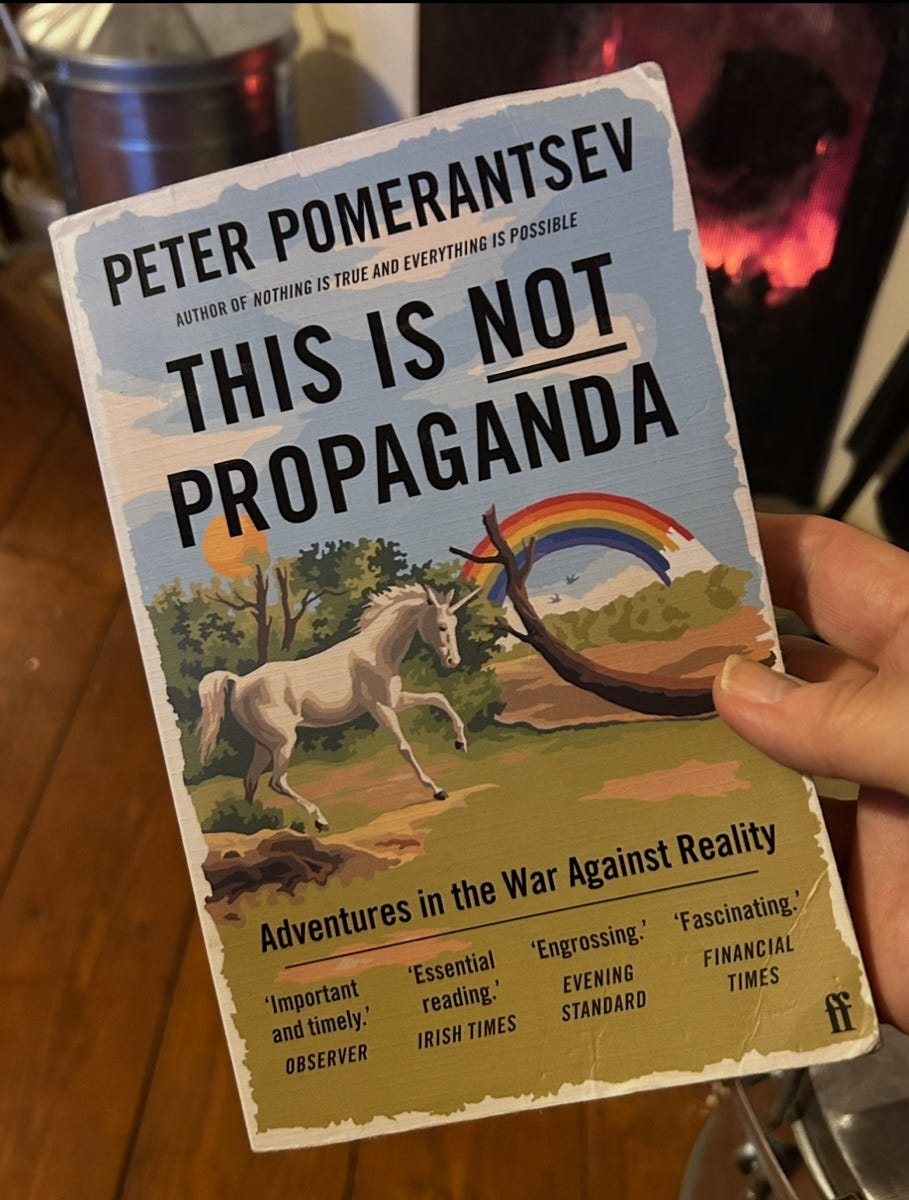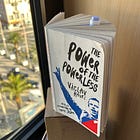The Most Amazing Information Warfare Blitzkrieg in History
A report on the Peter Pomerantsev book, ‘This Is Not Propaganda’
***Please take out a membership to support the light of truth.***
“We live in a world of mass persuasion run amok, where the means of manipulation have gone forth and multiplied, a world of dark ads, psy-ops, hacks, bots, soft facts, deep fakes, fake news, ISIS, Putin, trolls, Trump…”—Peter Pomerantsev, This Is Not Propaganda
In Part 3 of This Is Not Propaganda — The Most Amazing Information Warfare Blitzkrieg In History — I found the clarity I have been seeking for a decade: the Cold War has been replaced by the Information War.
And because the deployment of information weapons ‘acts like an invisible radiation’ on its targets — those words lifted directly from a 2011 Russian manual on Information Psychological War Operations — the targets are often oblivious to the poison they are ingesting. It is, after all, feeding their inherent biases, tailored to their exact specifications.
The voices on the frontline of the information war are repeatedly drowned out by cyber militias paid to target truth-tellers, and defending truth is now the fight of our lifetime.
But with the proper framing, it becomes quite clear that the information battle is upstaging the battles taking place on the ground.
As long as war porn, news porn, and trauma porn are served up in prime time, in what I call ‘Reality TV Fascism’, a coherent and cohesive Resistance is difficult to mount.
People find it increasingly murky to see connections between wars.
In Belfast, a pro-Palestinian activist denouncing war crimes doesn’t see anything wrong with Russia’s war in Ukraine. “It’s simply between Slavs,” he says. When facts refute the Russian propaganda he’s been ingesting, his face twists with the pain of cognitive dissonance.
As Peter Pomerantsev writes in This Is Not Propaganda: Adventures in the War Against Reality: “Faced with wildly conflicting versions of reality, people selected the one that suited them.”
My desire to wake people up to the ongoing mind hacks is more urgent than ever, because each country I visit in my travels through Europe is being ravaged by Information Warfare.
All it takes are cell phones, social media, throwaway agents, paid hacks, useful idiots, mined data, and nihilism.
Ideology has taken a back seat to gig work — in the Philippines, those willing to take cash to trash reputations can make seven times more than an average worker in their community.
A journalist who infiltrated the Internet Research Agency, the St. Petersburg, Russia, influence operation that attacked America in 2016, told Pomerantsev the people who worked there ‘were no monsters’ — they continued working there because ‘there was no social stigma to it’.
The journalist expected international outrage after she gave dozens of interviews exposing the IRA’s operations. Instead, she said she was met with shrugs.
“This horrified her even more. Not only did the lies churned out by the farm become reality, but the very existence of it was seen as normal itself,” writes Pomerantsev. “She felt as if the mindset promoted by the troll factory had literally penetrated into the country’s subconscious. She left the confines of the farm only to find that she was enveloped by it everywhere.”
Lies Are Not Illegal
In early 2018, the US Special Counsel Investigation found that the Russian IRA operation went beyond Russia and deep into the US, ‘making Americans hate each other’ even after its successful attack on the 2016 election. Over 30 million Americans shared its content, but the punishment never came. The operation expanded to three times its size.
Pomerantsev authored This Is Not Propaganda in 2019, and it should be required reading for every citizen in countries under siege. I identified dozens of countries being targeted with Russian active measures, but China also engages in disinformation campaigns within and without. And as Pomerantsev proves as he travels from country to country, ‘info-war charlatans’ are everywhere.
He writes: “We live in a world of mass persuasion run amok, where the means of manipulation have gone forth and multiplied, a world of dark ads, psy-ops, hacks, bots, soft facts, deep fakes, fake news, ISIS, Putin, trolls, Trump…”
Equal parts global investigation and personal memoir, This Is Not Propaganda not only takes us to influence operations in Russia, Finland, Estonia, Serbia, Mexico, the Philippines, Vietnam, and China, but Pomerantsev includes important stories from his parents. Both were Soviet-era dissidents harassed by the KGB. Pomerantsev writes how they were deported for the ‘simple right to read, to write, to listen to what they chose and to say what they wanted’.
As I type his words, I am reminded of what America so willingly gave up. Wasn’t it enough when Hillary Clinton warned us in 2015 that a Trump victory would roll women’s rights back to the Dark Ages? Apparently not.
As a veteran journalist, I saw evil forces colluding a decade ago and was horrified by corporate media’s eagerness to wash its hands of truth in favor of parroting the circus. The circus was better for ratings, but not for democracy.
Pomerantsev writes: “Big Words that once seemed swollen with meaning—democracy and freedom, ‘the people,’ Europe, and the West—have been so thoroughly left behind by life that they seem like empty husks, the last warmth and light draining out of them… And it’s not just conflicts or elections that are affected. I see people I have known my whole life slip away from me on social media, reposting conspiracies from sources I have never heard of, some sort of internet undercurrent pulling whole families apart, as if we never really knew each other, as if the algorithms know more about us than we do, as if we are becoming subsets of our own data…”
Totalitarian regimes, whether communist or fascist, specialized in silencing dissident voices — jail, psychiatric wards, exile. It’s so easy now for fascist terrorist states like Russia to simply whip up chaos online — obfuscation, partial reality, controlled opposition, covering all narrative bases until citizens in target countries legitimately don’t know who or what to believe.
Pomerantsev makes a clear connection between disinformation and the rise of fascism, how ‘one country can destroy another almost without touching it’.
In Part 1, Cities of Trolls, he asks: “What if the powerful can now use ‘information abundance’ to find new ways of stifling you, flipping the meaning of freedom of speech on its head to crush dissent, while always leaving enough anonymity to be able to claim deniability?”
What if?
He continues: “Who was it you were really up against? They were invisible, everywhere and nowhere. How can you fight an online mob? You couldn’t even tell how many of them were real.”
In my own work, my teams have identified many members of the online mobs who stalk us. No matter how hard someone tries to wipe their online history, a trail usually exists of their pre-troll selves. But in a war where the weapon is ‘invisible radiation’, and abusers play victim when called out, it’s difficult to hold cyber militias accountable.
So the best we can do is make people aware. When someone is doing good work, and suddenly, seemingly out of nowhere, a noisy mob appears online to denigrate them, support the person doing good work. No one’s perfect, and in a post-privacy world, we need to support the targets of harassment campaigns.
Pomerantsev doesn’t offer any pat solutions to the complex problem of Information Warfare, but it’s clear from his writing that those who read books — factual accounts of history, good literature — have more inoculation against disinformation. Reading reports, indictments, using trusted sources to investigate are first lines of defense against the ongoing menticide.
We can’t offer prescriptions to an illness we have not yet defined, but what Pomerantsev does so brilliantly is lay out the sheer magnitude of this global pox.
Despite years of warnings that flew off the pages of Bette Dangerous that it can happen ‘here’, too many Americans were caught up in narrative warfare against Joe Biden to see that a gentle man with a pulse — who could pass the torch to a young vibrant VP — was a far better bet than a Putin-loving fascist.
I will never forget the moment when I pulled an all-nighter to read the ‘doppelganger’ affidavit, which revealed in granular detail how Russia knew that Joe Biden was doing a great job, how America’s economy was the best in the world and how Biden had ‘fed the rednecks.’ In that passage I saw how the Russian attackers knew reality very well, and knew Americans better than we knew ourselves. In their own internal documents, they conceived of creating a proxy war to take down Joe Biden. If the report was accurate, and they pursued that route, then the operation was wildly successful.
There are multiple passages in the Pomerantsev book that haunt me. I return to them over and over again, as if trying to etch each word in memory, so I can pull the quotes out to break glass in case of emergency.
One of them is how easily millions of people gave up on facts — were the lies simply more pleasurable?
“Is disinformation just the excuse we use to let ourselves off the hook? We didn’t do anything ‘because we were confused by a bot farm’…”—Peter Pomerantsev, This Is Not Propaganda
In another passage, he writes: “One motif to the Kremlin storytelling was this: that the desire for freedom didn’t lead to peace and prosperity but to war and devastation (a message, first and foremost, meant for its own people so they didn’t become overenthusiastic about the idea). To make this narrative real meant ensuring that Ukraine could never achieve peace. The country had to bleed.”
To disinformation warriors trained to run every narrative through a ‘how does this benefit Putin’ lens, it is obvious how much taking place on the world stage is there to obfuscate Putin’s war crimes in Ukraine.
His state-sponsored trolling is a gimmick, a disappearing act, where facts evaporate, and lies on repeat become some kind of reality.
“And it was books, only books, that never betrayed me. I see all genuine literature as anti-Soviet,” writes Pomerantsev.
Democracy At Sea
Conspiracies are used to maintain control, and conspiracies are always on the rise when fascists are attempting to seize power. They are used to erode trust and to stoke cynicism — it’s a tactic a Russian media analyst calls ‘white jamming’, notes Pomerantsev. If you believe shadowy forces control everything, then what possible chance do you have of turning it around, he asks.
In these conspiracies, only Trump and Putin can fix ‘it’.
‘Community’ becomes bots and cyborgs, sock puppets, and paid actors. Real people get lost in the code — separated from their own reality, a world of pure simulation.
I often return to how Timothy Snyder described the West’s underwhelming response to Putin’s invasion of Ukraine in 2014.
“Russia invaded Ukraine and basically persuaded us that it didn’t actually happen.
“While Russia was invading Ukraine, the most important thing that was happening in the minds of the West, not just Americans, were discussions about whether there’d been a coup in Ukraine or whether the Ukrainians are all Nazis, or maybe they’re all gay, or maybe they’re all Jews, depending on what social media you were following, right?
“The Russians totally had our minds in a trap, and we were totally unprepared… they were paying attention to us, at least in the negative sense of knowing what our vulnerabilities were on social media.”—Timothy Snyder, Frontline transcripts
As Pomerantsev writes: “NATO’s Supreme Allied Commander had called the Russian campaign to take Crimea ‘the most amazing information warfare blitzkrieg’ in history. But it was ordinary Ukrainians, often abandoned by a shoddy government, who had to find ways to make sure the information blitzkrieg wouldn’t spread to the rest of the country, too.”
If your neighbor is Russia, information warfare is easy to spot in the wild.
Dead Words Smell Foul
Pomerantsev concludes his book with personal stories — a visit with his twin sons to his parents, who describe a time when grandfather, Igor, was arrested for reading books. Lina, their grandmother, quotes a line from a poem — ‘Dead words smell foul…’ She is referencing how the big words — words like freedom, democracy — had become calcified and lost their meaning.
Ultimately, we must ask if democracy can survive the internet. We must question if we can regain our truth consciousness in a post-Cambridge Analytica world.
I believe we can if we continue to read good books, share what we learn, and spend less time self-cyborging on social media and more time in the very real world, which so desperately needs us to pay attention to its wants and needs.
It’s no longer okay to use ‘being confused by a bot farm’ as an excuse to ignore reality.
We are each responsible for reprioritizing a fact-based world if we are to survive at all.
That, quite frankly, is not propaganda.
****
This Is Not Propaganda: Adventures in the War Against Reality by Peter Pomerantsev.
****
****
Related:
****
Bette Dangerous is a reader-funded magazine. Thank you to all monthly, annual, and founding members.
I expose the corruption of billionaire fascists, while relying on memberships for support.
Thank you in advance for considering the following:
Share my reporting with allies
Buying my ebooks
A private link to an annual membership discount for older adults, those on fixed incomes or drawing disability, as well as activists and members of the media is available upon request at bettedangerous/gmail. 🥹
More info about Bette Dangerous - This magazine is written by Heidi Siegmund Cuda, an Emmy-award winning investigative reporter/producer, author, and veteran music and nightlife columnist. She is the cohost of RADICALIZED Truth Survives, an investigative show about disinformation and is part of the Byline Media team. Thank you for your support of independent investigative journalism.
🤍
Begin each day with a grateful heart.
🤍






Whoh! Great stuff Heidi, Thank you =] 🌊🌊🏄🏄♂️🪷